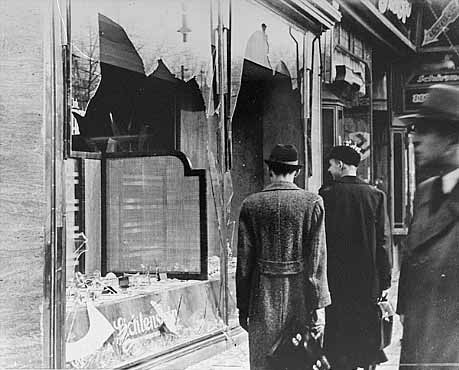Kristallnacht, or the Night of
Broken Glass, was a night of bloody attacks against Jews
throughout Hitler's Germany and Austria and the
Sudetenland, on November 9 and 10, 1938.
Jewish homes and businesses were
ransacked, as as Hitler's Sturmabteilung stormtroopers
and civilian supporters attacked shops, towns and
villages, destroying Jewish-owned buildings with
sledgehammers and leaving the streets covered in pieces
of smashed window glass; the origin of the name "Night of
Broken Glass." Ninety-one Jews were killed, and 30,000
Jewish men were taken to concentration camps, where they
were tortured for months, with over 1,000 of them dying.
Between 1,000 and 2,000 synagogues were attacked, and 267
set on fire. Almost 7,500 Jewish businesses were
destroyed, and Jewish cemeteries and schools were
vandalized.
Martin Gilbert writes that no event in
the history of German Jews between 1933 and 1945 was so
widely reported as it was happening, and the accounts
from the foreign journalists working in Germany sent
shock waves around the world. The Times of London wrote
at the time: "No foreign propagandist bent upon
blackening Germany before the world could outdo the tale
of burnings and beatings, of blackguardly assaults on
defenceless and innocent people, which disgraced that
country yesterday."
The event that gave the Hitler's
followers an excuse to launch the attacks, was the
assassination of the German diplomat Ernst vom Rath by a
German-born Polish Jew named Herschel Grynszpan, in
Paris, France. Grynszpan's father's shop in Hanover had
been confiscated a few days earlier, and his family
deported to Poland. The younger Grynszpan had intended to
assassinate the German ambassador to France in
retaliation, but settled on the Third Secretary, von
Rath, instead. This rash act gave Hitler's Chief of
Propaganda, Joseph Goebbels, the perfect rationalle for
inciting more hatred and violence against the Jews in
Germany.
On November 11, the German Minister of
the Interior issued regulations prohibiting Jews'
possession of weapons. This law prohibited Jews from
"acquiring, possessing, and carrying firearms and
ammunition, as well as truncheons or stabbing weapons.
Those now possessing weapons and ammunition are at once
to turn them over to the local police authority." This
form of gun control ensured that Jews could not
effectively fight back as Hitler planned more attacks on
the Jewish community.
The Kristallnacht attacks was followed
by increased economic and political persecution of Jews
in Germany. Kristallnact and is seen by many historians
as the beginning of Hitler's Final Solution and the
Holocaust against the Jews. Hitler was encouraged by the
passive response of the German population, specifically
the German churches, and knew he could go much further in
his war on the Jews in Germany.
Pin
It
